Caring for a rabbit is not particularly easy. A rabbit’s diet must be carefully planned because its digestive system is extremely sensitive. One of the top questions that rabbit owners ask is: “how many times a day should I feed my rabbit.” This article will answer that intriguing question and give you tips on proper rabbit feeding.
Here is how many times you should feed your rabbit. Read along!
How many times a day should I feed my rabbit?
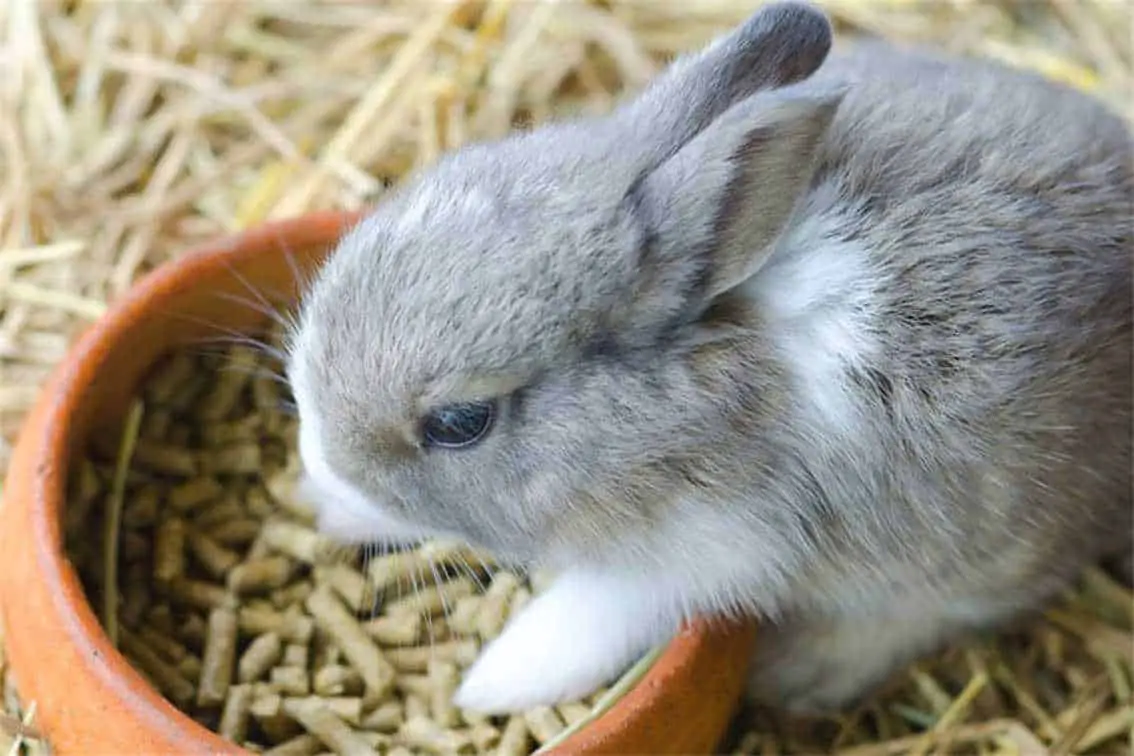
Rabbits should eat two times every day. You should prepare enough food daily so they can eat twice within 24 hours. During noon, rabbits should have hay, fruits, and vegetables. For dinner, give your rabbit feeds.
You can give your rabbits an unlimited amount of hay each day because rabbits can digest hay and other leafy vegetables easily. However, it’s best to limit commercial rabbit pellets and serve them in small amounts.
Giving your rabbits lots of commercial rabbit food can result in weight gain, leading to obesity, as these foods are high in caloric content.
As a rabbit owner, you should know that rabbits’ teeth grow continuously throughout their life. Because of this, they are likely to suffer from overgrown teeth. To compromise, rabbits need to munch and nibble on a lot of hay each day. Eating enough hay can abrade your rabbit’s teeth, which greatly solves the problem of having overgrown teeth.
What time should I feed my rabbit?
Feeding your rabbit in the morning or afternoon and before you go to bed is ideal. While there is no exact time when your rabbit will eat its meal, experts say rabbits tend to eat pellets during the evening and nighttime.
Feeding baby rabbits and feeding adult rabbits are two different things. Rabbits of various ages differ in their nutritional needs. Hence, every rabbit’s diet and food intake should be considered independently.
Feeding baby rabbits
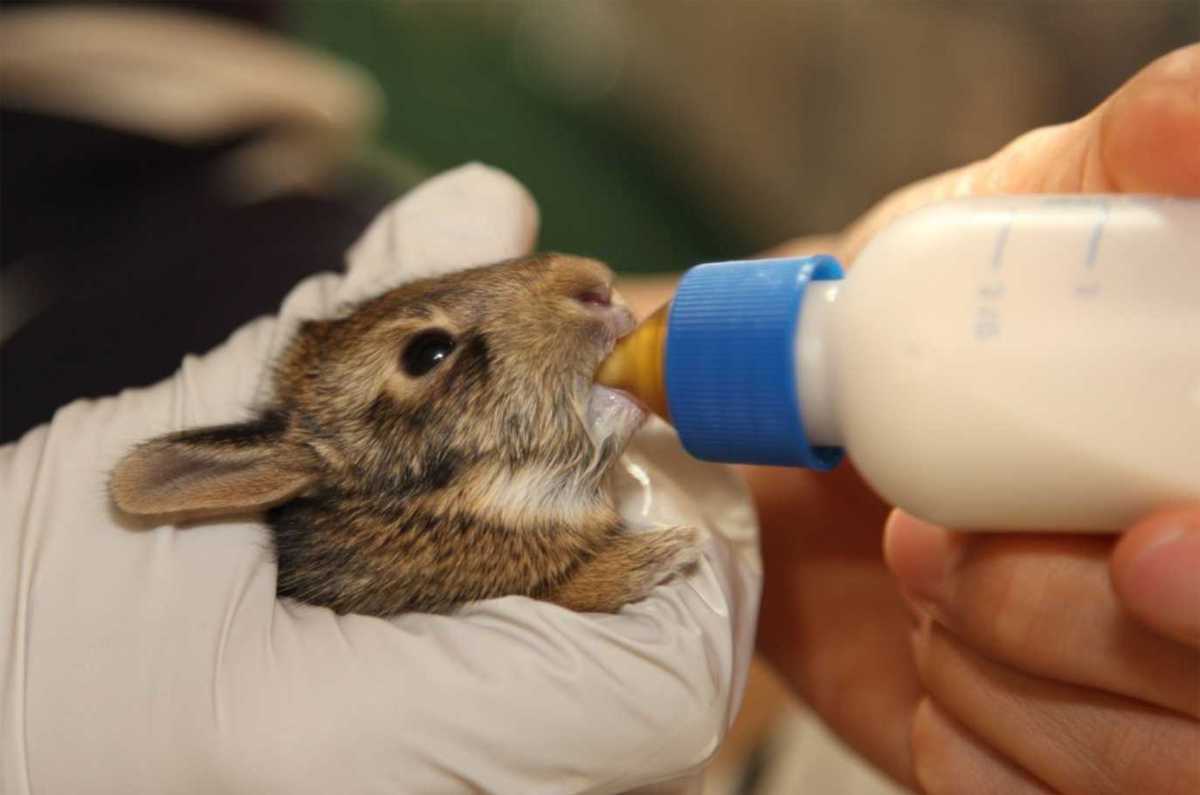
Unlike other mammals, does do not stick with their babies even right after birth. We all know rabbits are prey animals. Because of their instincts, they choose to stay away from anything that predators would target. Among these are their baby bunnies.
By knowing this information, you must think of how you can help feed and maintain baby rabbits’ health. Caring for baby bunnies can be tricky, especially when it comes to feeding them.
The general rule is not to intervene if the mother rabbit is still present. You do not want to make unnecessary actions that would disturb their connection and care. If the mother rabbit is missing, you should start feeding the baby rabbits as soon as possible.
According to the University of Miami’s Biology Department’s Dr. Dana Krempels, you’ll need a baby formula that consists of the following:
- ½ cup whole goat milk
- ½ cup Kitten Milk Replacer
- 1 tbsp freeze-dried colostrum
- ½ teaspoon heavy cream
Before you start feeding baby rabbits, you have to make sure your hands are clean. Wash your hands with warm, soapy water. Fill the bottle with the baby rabbit formula and hold the rabbit in place. Gently put the bottle nipple over the kitten’s lips.
Remember to not force the formula out of the baby bottle, as this may cause overfeeding. Baby rabbits should be fed once every day, for around 5 minutes each feeding.
Feeding adult rabbits
Adult rabbits should be provided with unlimited fresh hay. Besides hay, an adult rabbit’s diet should consist of good quality pellets, water, vegetables like dark leafy greens, and fruits. Introducing new foods to your rabbits should be done with caution since a rabbit’s digestive system is sensitive.
Transitioning to a new type or brand of food should be gradual, no matter what the age of your rabbit is. Switching from different foods can upset your rabbit’s stomach, which leads to serious digestive health issues.
Water and rabbits
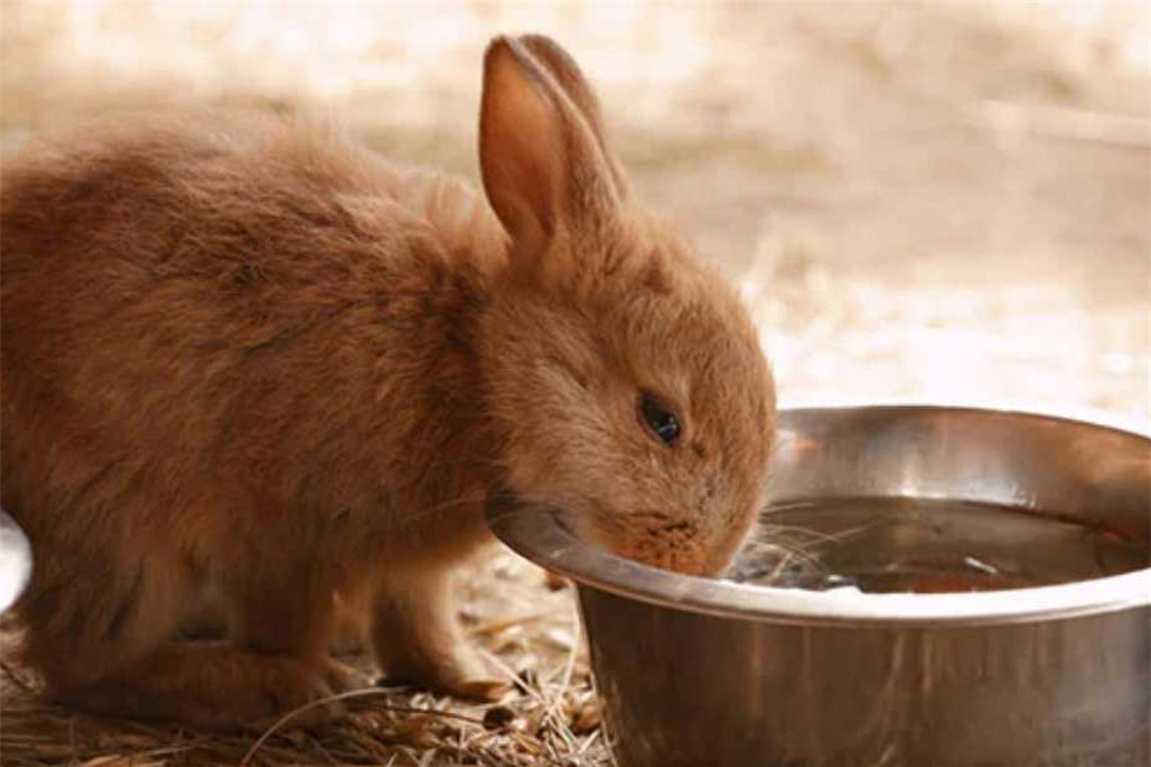
We can’t stress this enough: Rabbits need access to clean water 24/7 to keep them hydrated. Water is an essential part of your rabbit’s diet. Never miss providing your pet with enough water daily.
Placing a water bottle mounted on your rabbit’s cage is ideal. Although sometimes, rabbits get irritated with these types of containers. Hence, you can also opt to have water bowls inside your rabbit’s hutch. The good thing is you can always switch, mix, and match these supplies up!
Hay and rabbits
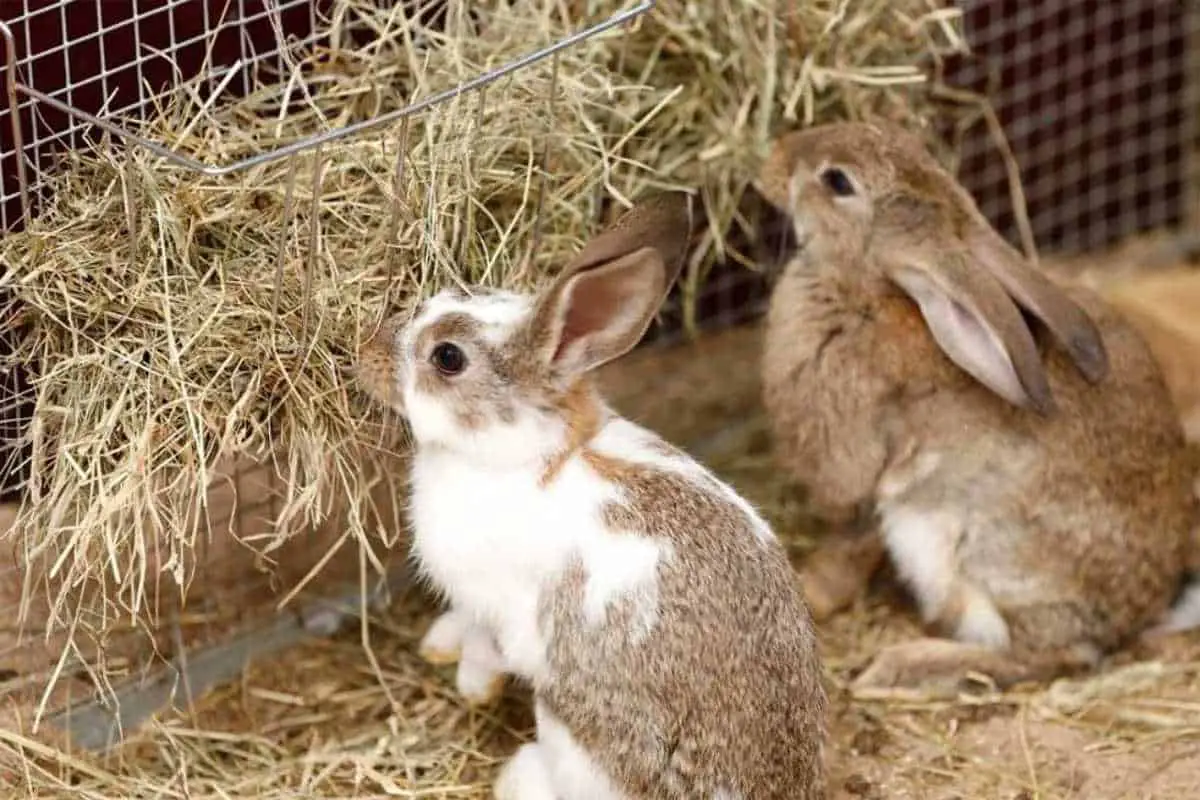
If there’s one thing rabbits can eat forever, it would be hay. Rabbits can not live without hay in their diet! Like water, hay needs to be available for consumption 24/7. Hay is high in fiber which rabbits need for optimum digestive and dental health. Without hay, a rabbit’s gut will not function properly. This results in an array of illnesses and, in unfortunate cases, early death.
There are different types of hay that you can give your rabbit. Below are some your rabbit can enjoy:
- Timothy Hay: This type of hay grows in cool seasons and can stand harsh winters. When compared to alfalfa hay, Timothy hay has less protein content. What’s great about this type of hay is that it has plenty of fiber and protein, which is great for adult bunnies. This type of hay is the most affordable type of rabbit hay, so it remains to be the top choice of rabbit owners.
- Alfalfa Hay: Alfalfa hay is rich in minerals, providing your rabbit with high energy. This type of hay is harvested during spring or early summer. Alfalfa hay is said to be good for bunnies up to 6 months old. This hay contains high levels of calcium and protein for growth and development.
- Orchard Hay: Like Timothy hay, Orchard hay is also a cool-season grass. It is rich in sugar and fiber and contains low levels of protein.
- Oat Hay: Oat hay is another type of hay high in vitamins, fiber, and minerals. It is low in protein and is not as affordable as other types of hay if not blended.
- Herbal Hay: Herbal hay is hay combined with herbs, as the name implies. Because herbs provide essential vitamins and nutrients, herbal hay is a popular choice for rabbit owners.
Vegetables and rabbits
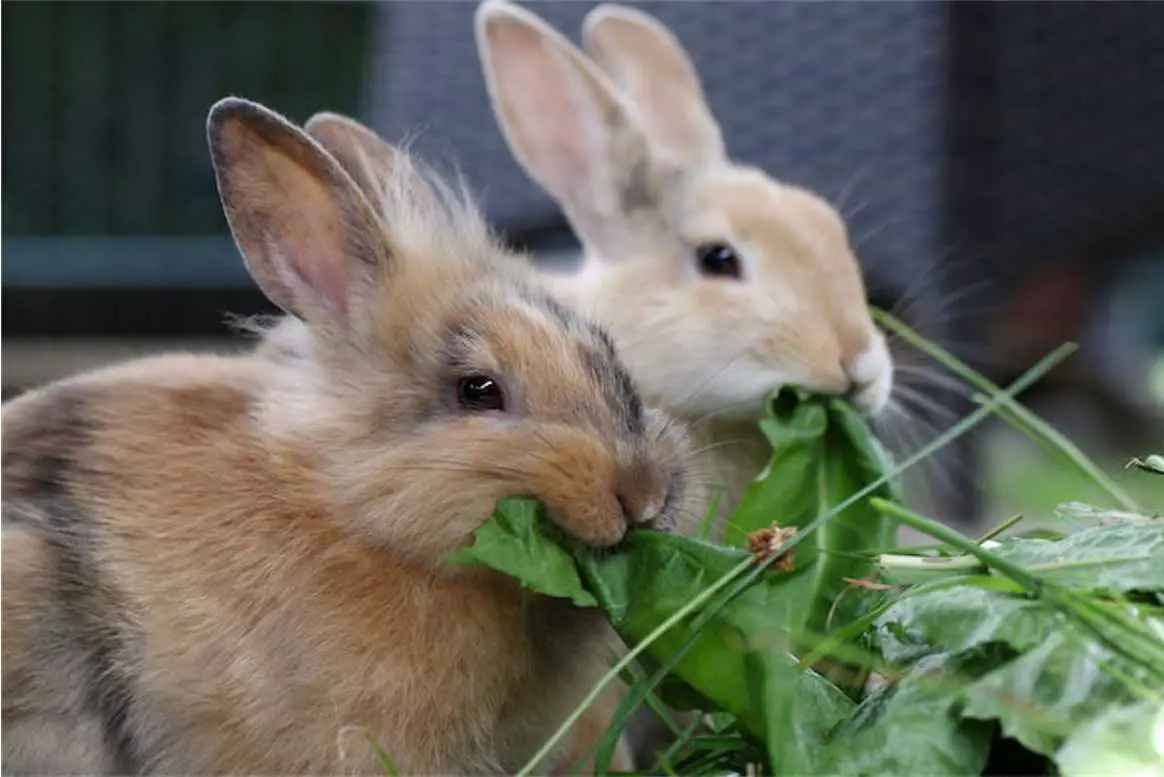
Besides grass and hay, rabbits also love vegetables. Most greens are safe for rabbit consumption, with very few limitations. You should give no more than 2 cups of fresh vegetables every day to your adult rabbit. For small, young rabbits under 5 pounds, only 1 cup of fresh vegetables should be served per day.
Because rabbits have sensitive digestive systems, you need to observe your rabbit every time you introduce new vegetables.
Vegetables that are safe for rabbit consumption include the following:
- Bok choy
- Brussels sprouts
- Cucumber
- Fennel
- Basil
- Cilantro
- Mint
- Oregano
- Rosemary
- Sage
- Parsley
- Romaine lettuce
- Green leaf
- Arugula
- Okra leaves
- Radish tops
- Watercress
- Zucchini
You can give your rabbit vegetables once daily. However, some vegetables should only be limited to once or twice every week.
Give your rabbit the following vegetables sparingly:
Fruits and rabbits

Rabbits can eat fruits once or twice every week. Fruits that are safe for your rabbit include the following:
- Apple
- Banana
- Blueberries
- Strawberries
- Cherries
- Grapes
- Melon
- Peaches
- Nectarine
- Orange
- Kiwi
- Papaya
- Mango
- Plum
Remember to remove fruit peels, leaves, stems, and seeds before giving the fruits to your rabbit. Do not serve the whole fruit at once. Slice the fruit into small portions and follow the recommended amount per daily serving.
Is my rabbit too fat?
If you’ve followed the recommended times you should feed a rabbit per day, your rabbit should be fine. However, some rabbits tend to grow bigger than others. Excess weight can strain a rabbit’s cardiovascular system, which leads to worsened arthritis. A personalized weight loss program must be designed for overweight rabbits, as this condition can lead to serious health problems.
If you’re unsure whether your rabbit is too fat, it’s best to consult a vet. Vets would likely alter your rabbit’s diet plan and make changes to the frequency of its feeding.
Is my rabbit too thin?
You can’t tell if your rabbit is too thin or fat by just using your sense of sight. We recommend feeling your rabbit’s body to look for signs of weight problems.
If you stroke your rabbit’s back and feel its backbone stick up, your rabbit is probably too thin. Because you can not specifically determine and diagnose your pet, it’s still best to visit a veterinarian for a definite diagnosis and treatment plan.
Summary
The general answer to your question, “how many times a day should I feed my rabbit,” is twice daily. To make things easier for you, you can feed your rabbit once, as soon as you wake up, and once before you go to bed. If you follow the recommended guidelines for rabbit feeding, you’ll likely have a happy and energetic bunny!